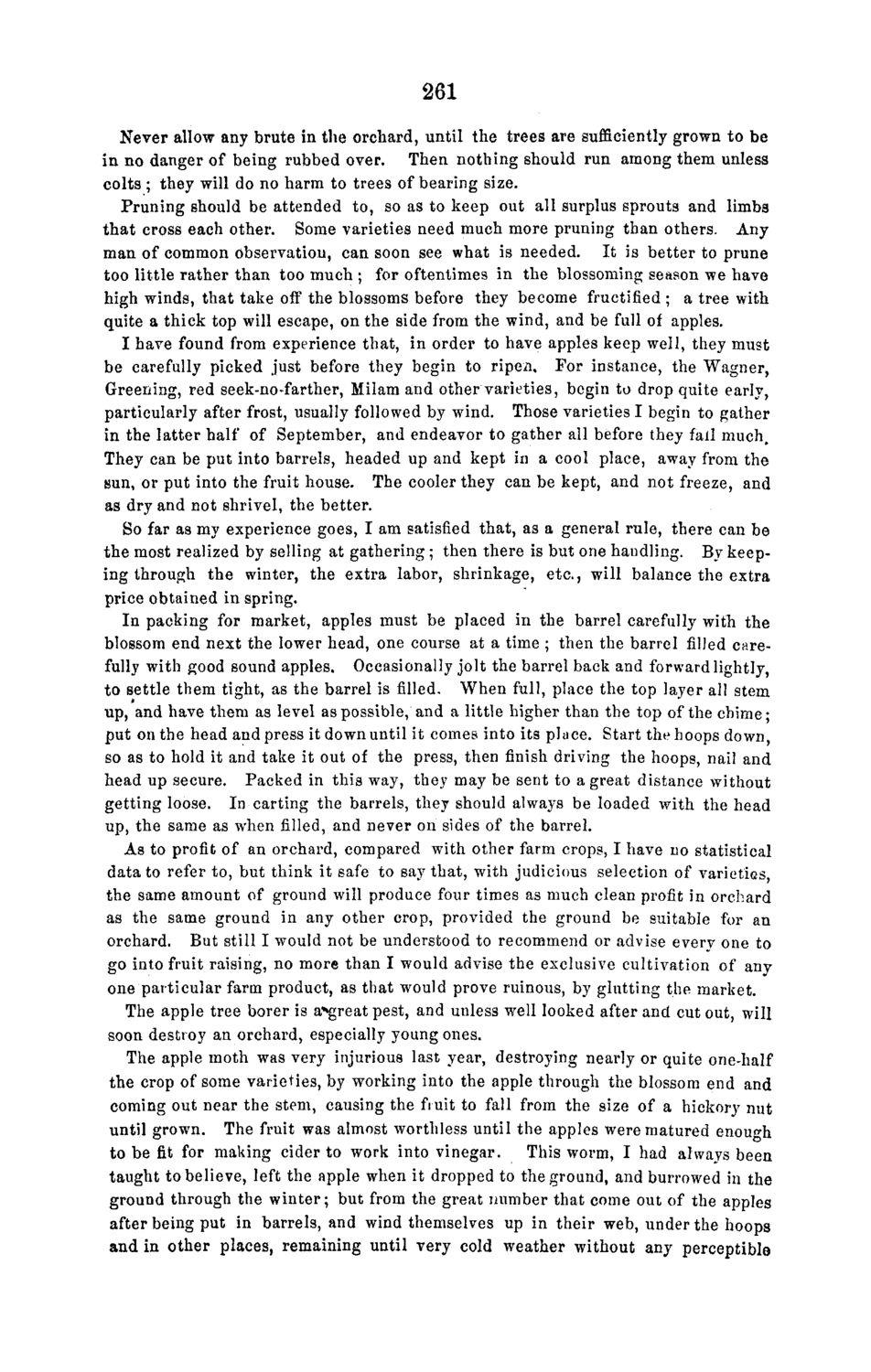| |
| |
Caption: Board of Trustees Minutes - 1868
This is a reduced-resolution page image for fast online browsing.

EXTRACTED TEXT FROM PAGE:
261 Never allow any brute in the orchard, until the trees are sufficiently grown to be in no danger of being rubbed over. Then nothing should run among them unless colts ; they will do no harm to trees of bearing size. Pruning should be attended to, so as to keep out all surplus sprouts and limbs that cross each other. Some varieties need much more pruning than others. Any man of common observation, can soon see what is needed. It is better to prune too little rather than too much ; for oftentimes in the blossoming season we have high winds, that take off the blossoms before they become fructified ; a tree with quite a thick top will escape, on the side from the wind, and be full of apples. I have found from experience that, in order to have apples keep well, they must be carefully picked just before they begin to ripen. For instance, the Wagner, Greening, red seek-no-farther, Milam and other varieties, begin to drop quite early, particularly after frost, usually followed by wind. Those varieties I begin to gather in the latter half of September, and endeavor to gather all before they fall much. They can be put into barrels, headed up and kept in a cool place, away from the sun, or put into the fruit house. The cooler they can be kept, and not freeze, and as dry and not shrivel, the better. So far as my experience goes, I am satisfied that, as a general rule, there can be the most realized by selling at gathering; then there is but one handling. By keeping through the winter, the extra labor, shrinkage, etc., will balance the extra price obtained in spring. In packing for market, apples must be placed in the barrel carefully with the blossom end next the lower head, one course at a time ; then the barrel filled carefully with good sound apples. Occasionally jolt the barrel back and forward lightly, to settle them tight, as the barrel is filled. When full, place the top layer all stem up, and have them as level as possible, and a little higher than the top of the chime* put on the head and press it down until it comes into its place. Start the hoops down, so as to hold it and take it out of the press, then finish driving the hoops, nail and head up secure. Packed in this way, they may be sent to a great distance without getting loose. In carting the barrels, they should always be loaded with the head up, the same as when filled, and never on sides of the barrel. As to profit of an orchard, compared with other farm crops, I have no statistical data to refer to, but think it safe to say that, with judicious selection of varieties, the same amount of ground will produce four times as much clean profit in orchard as the same ground in any other crop, provided the ground be suitable for an orchard. But still I would not be understood to recommend or advise every one to go into fruit raising, no more than I would advise the exclusive cultivation of any one particular farm product, as that would prove ruinous, by glutting the market. The apple tree borer is a^reat pest, and unless well looked after and cut out, will soon destroy an orchard, especially young ones. The apple moth was very injurious last year, destroying nearly or quite one-half the crop of some varieties, by working into the apple through the blossom end and coming out near the stem, causing the fruit to fall from the size of a hickory nut until grown. The fruit was almost worthless until the apples were matured enough to be fit for making cider to work into vinegar. This worm, I had always been taught to believe, left the apple when it dropped to the ground, and burrowed in the ground through the winter; but from the great number that come out of the apples after being put in barrels, and wind themselves up in their web, under the hoops and in other places, remaining until very cold weather without any perceptible
| |